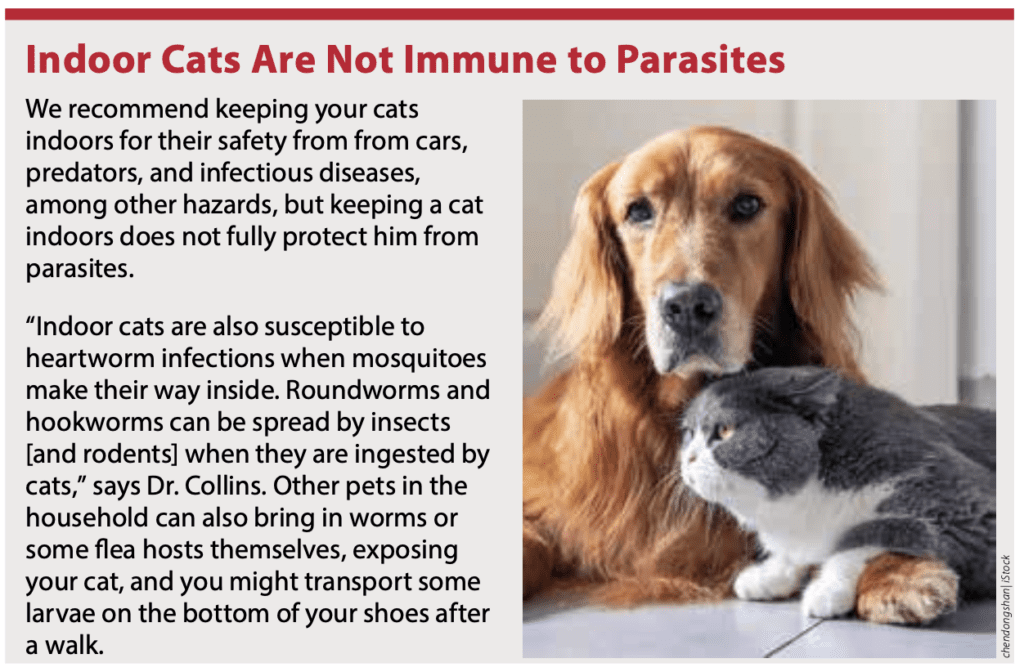Skipping your cat’s deworming can put other pets and family members at risk. “The ideal deworming protocol is going to vary from animal to animal,” says Brian Collins, DVM, board-certified canine and feline veterinarian and section chief of the community practice service at Cornell University’s College of Veterinary Medicine. “There are factors such as age, lifestyle, and geographic area that help determine what will be recommended,” making monthly deworming a good idea.
Heartworm Is Everywhere
“Cats that live in heartworm endemic areas should be treated with a product that prevents the development of heartworm infections,” says Dr. Collins. “Spread by mosquito bites, heartworm is most commonly found in the southeastern part of the U.S., the Mississippi River Basin, and Texas, but heartworm has been diagnosed in every state. If you live in an area where there is a concern for dogs and heartworm disease, you should also be concerned about cats.”
Although cats do not seem to be as susceptible to heartworm infection as dogs, we also don’t test our cats regularly, so there may be cases getting missed. And the truly scary thing is that if your cat does get heartworm, there is no cure.
Dewormers that target heartworm are usually applied to the skin once a month. “Most of them also have coverage against roundworms and hookworms, which are common parasites of cats,” says Dr. Collins.
GI Parasites
There are lots of “creepy crawlies” hoping to make a home in your cat’s intestines. Common perpetrators include:
- Roundworms
- Hookworms
- Tapeworms
“Indoor-outdoor cats are especially susceptible to heartworms, roundworms, hookworms, and tapeworms,” says Dr. Collins. “A monthly product that treats heartworm, roundworm, and hookworm infections will provide excellent protection. An additional product can be given for tapeworms, either monthly based on lifestyle or when the telltale tapeworm segments are noted.”
Cats can be exposed to roundworms and hookworms by eating infected wildlife or even just walking through a contaminated area and then grooming. Hookworms can also burrow directly through the skin.
Tapeworms are usually acquired by hunting and eating infected wildlife or from fleas, which transmit them in their bites. If your cat does not hunt and does not have fleas, he is less likely to need regular deworming for tapeworms.
Deworming Protects You, Too
“Regular deworming is also recommended to protect the family, as hookworms and roundworms are zoonotic parasites,” says Dr. Collins. Zoonotic means that a parasite can be spread from animals to humans.
Most parasites are transmitted through feces, potentially stirred up and inhaled when you clean the litterbox or inadvertently ingest afterward, but some worms can also burrow through our skin. Deworming your cat not only protects her, but you as well.
Which Product Should I Choose?
Talk to your veterinarian about your cat’s lifestyle, where you live, and other pets in the house to determine the product that is the best fit. As Dr. Collins says, something that treats heartworm, roundworm, and hookworm is a great option for most cats.
If your cat also goes outside, flea and tick treatment is likely also on your list of wants. There are products available that cover multiple bases, including to treat fleas, ticks, heartworm, roundworm, and hookworm.
Do I Have to Deworm Year-Round?
It is easy to think that cold northern winters will provide some relief from parasites. Unfortunately, cold weather is no guarantee. Parasites can continue to thrive and spread inside our homes and in the habitats of their hosts all winter long. It only takes a brief warm spell for dormant parasites to wake back up.
Because of this, deworming year-round is wise. Follow the instructions on your chosen product, and set reminders on your phone so that you don’t miss administering a dose. The timing of each dose of dewormer is important because it ensures that you break the lifecycle of all the target parasites. Missing a dose even by a few days can result in some “slipping through” and continuing to parasitize your cat.ν
Indoor Cats Are Not Immune to Parasites
We recommend keeping your cats indoors for their safety from from cars, predators, and infectious diseases, among other hazards, but keeping a cat indoors does not fully protect him from parasites.

“Indoor cats are also susceptible to heartworm infections when mosquitoes make their way inside. Roundworms and hookworms can be spread by insects [and rodents] when they are ingested by cats,” says Dr. Collins. Other pets in the household can also bring in worms or some flea hosts themselves, exposing your cat, and you might transport some larvae on the bottom of your shoes after a walk.
Brian Collins, DVM, is senior lecturer, section of community practice service, section chief, at Cornell University’s College of Veterinary Medicine.




